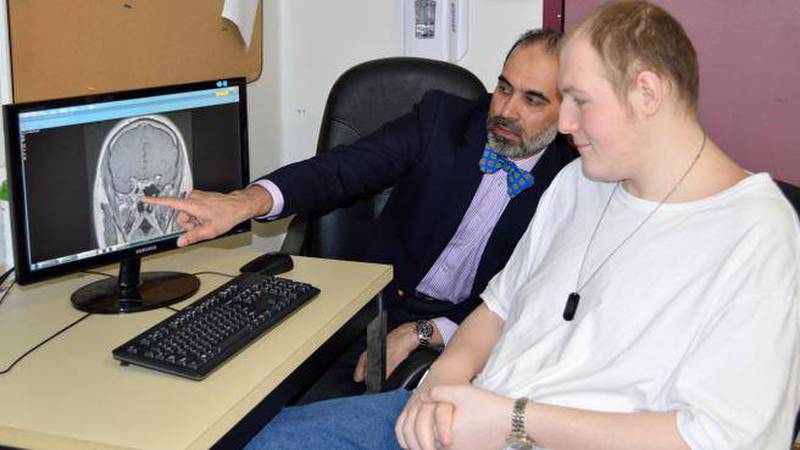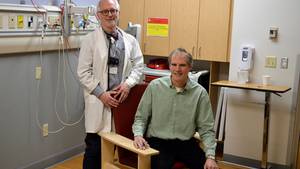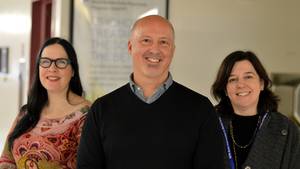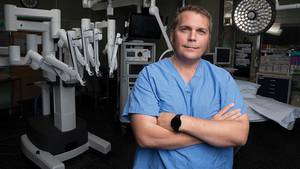Zack Metcalfe
David Bernard first became aware of the pituitary gland when he underwent an emergency operation to remove a large tumour from the base of his brain. This benign mass had been slowly growing in that area for many years, quietly destroying his pituitary gland and at the same time causing his body shape to change.
At age 12, David was already large next to his classmates, but around that time, his height began to increase rapidly and he started gaining weight. His spine twisted and his legs grew out of proportion, driving one uncomfortably into his hip. David’s days became marked by pain, exhaustion and headaches, eventually making school impractical. Outings, exercise and other aspects of a teenager’s life were stolen from him. Then, in July of 2011, his condition worsened.
“I started sleeping,” says David, “but it wasn’t really sleeping because I couldn’t be woken up.”
Try as they might, with shouts and violent shakes, David’s family couldn’t rouse him until he woke of his own accord. Around this time he began suffering from troubled vision as the yet undiscovered tumour began putting pressure on his nerves for vision which sit next to the pituitary gland. An MRI scan was the defining moment.
“The tumour had destroyed his normal pituitary cells,” says Dr. Ali Imran, co-director of the QEII’s neuropituitary clinic. “Pituitary is the master gland of the body that controls all major hormonal functions. Hormones are chemicals that are released by different glands and they regulate almost every function of your body including: growth, metabolism, glucose levels, reproduction, bone health and your mental and physical wellbeing.”
David’s body was dangerously hormone-deficient in every category when his tumour was discovered in the fall of 2011. He stood a towering 6.5 feet tall when Dr. Imran first met him, weighing 275 pounds and wearing size 13 shoes, all at the age of 15. David’s pituitary tumour had been overproducing growth hormone, leading to a rare condition known as gigantism. If untreated, these patients can die very young.
“The trouble is that gigantism is a slowly progressing disease and the changes that occur can’t be noticed on a day-to-day basis,” says Dr. Imran. David’s height, weight, overgrown hands, feet, organs and facial features were all the result of excess growth hormone.
The tumour was surgically removed by QEII neurosurgeon Dr. David Clarke and his team two weeks later. The fragments of tumour remaining were treated with radiation and have been in remission ever since.
David is 19 now. His regular hormonal functions have been replaced entirely with hormonal supplements and, thanks to two additional surgeries - one to straighten his spine and another to correct his leg - he stands upright and comfortably. Many effects of gigantism are irreversible, such as David’s great height, but his energy levels are on the rise and he can now have a more normal life.
“I’m not an overly emotional person,” says David, explaining his calm nature and courage throughout the experience. “I didn’t cry over any of it because there was no point.”
David visits the QEII only once a year now, so Drs. Imran and Clarke can keep an eye on his progress. David is one of 1,700 individuals with pituitary disorders under the care of the neuropituitary clinic, many of whom will be monitored by Dr. Imran and his colleagues for their entire lives. This clinic, a division of the QEII’s overarching endocrinology clinic, accepts patients from across Atlantic Canada, and sometimes as far away as British Columbia. Working alongside Dr. Imran is neurosurgeon and co-director of the clinic Dr. David Clarke, nurses Lisa Tramle and Andrea Hebb, and program coordinator Raven Glasgow.
“Above all it’s the patients who make the program,” says Dr. Imran. “They allow us to be a part of their lives and a part of their journey. “Many of these patients are suffering physically as well as psychologically, in ways we cannot even imagine. But to see how they brave their way through their illness is a very humbling experience.”








